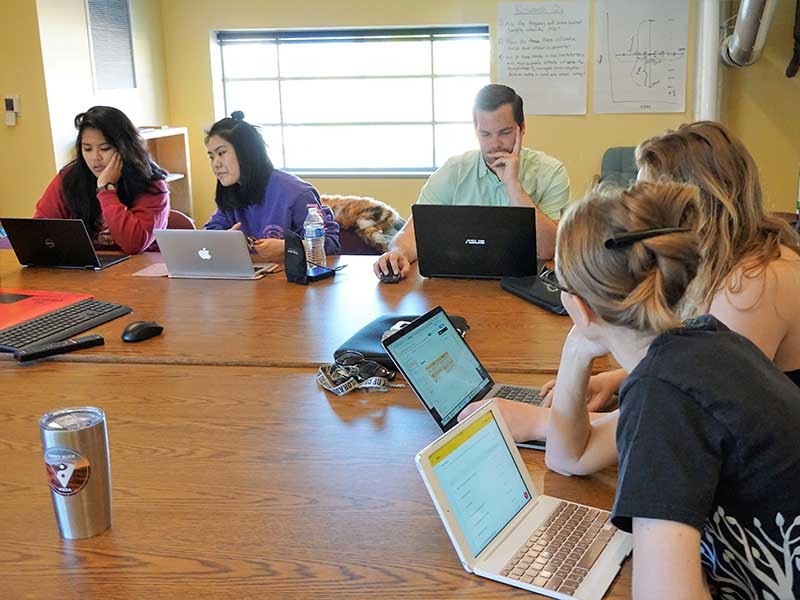USU Grad Students Gain Cross-Disciplinary Skills to Tackle Climate Change
By Lael Gilbert |
How do you tackle a wicked problem like climate change? This hot-button issue involves a complex web of tenacious public opinion, volatile political environments, variable economics, intricate natural systems and time frames much longer than most folk’s attention span. The truth is there are no easy answers.
But there are complex ones, and it’s these nuanced approaches that graduate students are pursuing in the Climate Adaptation Science program – a cross-disciplinary, hands-on training program offered through the S.J. and Jessie E. Quinney College of Natural Resources at Utah State University. With support from 62 faculty members from 10 departments, this innovative program trains people with skills necessary for complex climate change solutions.
“We’ve come to recognize that issues like climate change are not well addressed by traditional academic approaches,” said Courtney Flint, professor of sociology and co-lead of the program. “We are finding ways to move climate adaptation ideas from the books into practice.”
In addition to offering participants a strong foundation in science, the program is designed to increase technical and communication skills of graduates inside and outside of academics. It combines traditional classroom coursework with training in communication and book-end internships with federal or state agencies. The experience is capped by a dive into research initiated by the students themselves.
Participants work through the two-year program in teams … the pioneer cohort recently published a culmination of their research in the journal Fire. Their work investigates wildfire trends in the Intermountain West, how wildfire has influenced local economies and how those booms and busts have shifted managers’ perspective and decision-making.
The results were complex. They found that local economies sometimes experienced short-term benefits during and after a wildfire event … it increased local investment through new construction, rebuilt roads and repaired infrastructure. But there were also economic drawbacks due to loss of visitors during the fires. Through face-to-face interviews with managers, student researchers learned the majority of managers felt the greatest challenges they faced were actually human factors like budgets and bureaucracy, rather than environmental ones. The interdisciplinary nature of this research highlights the interconnectedness of the physical, economic and social aspects of wildfire, and gave students a chance to understand land management in practice.
Internships gave students another chance to understand work on the ground.
“The internships are a transformative experience for most students,” said Patrick Belmont, associate professor of hydrology and program co-lead. “They get a chance to apply academic knowledge and to open their eyes to reality of day-to-day work at these agencies.”
“Human interaction is one of the key ingredients to our success,” said Flint. “We also bring in guest lecturers from science, management and policy backgrounds for exchange events. We try and make sure that students spend time with government representatives and beyond so they learn how to find a common language to explore these problems.”
Addressing the reality of climate change solutions pushes many out of their comfort zone, Belmont said. “Some of these conversations can be challenging … even for me … but they’ve turned out to be some of the most rewarding experiences of my career,” he said.
“This approach isn’t easy,” said Flint. “We know it is a huge commitment of time and energy. Not everyone is hard-wired for trans-disciplinary work … and that’s okay. We still need people to go deep into specific areas of research. But to get that research on the ground you need people to be stretched beyond their traditional comfort zones. You have to be willing to listen and learn, to lead and to sometimes follow. You have to have skills to listen to others as well as communicate your own ideas.”
Graduates of the program have the chance to acquire broad technical literacy, encounter a variety of points of view about science and have the opportunities to communicate with to diverse audiences, according to Nancy Huntly, director of the Ecology Center and director of the program. They learn to think about broader impacts of their research, work on projects in partnerships and explore diverse career options in a context where nonacademic careers are valued the same way academic careers are valued.
The Climate Adaptation Science program is funded by The National Science Foundation Research Traineeship Program. It initiated a third cohort of students this year and will be funded through August 2021. For more detailed information visit climateadaptation.usu.edu.
WRITER
Lael Gilbert
Public Relations Specialist
Quinney College of Natural Resources
435-797-8455
lael.gilbert@usu.edu
CONTACT
Nancy Huntly
Professor and Director
Department of Biology and Ecology Center
(435) 797-2555
nancy.huntly@usu.edu
TOPICS
Research 879stories Ecology 173stories Climate 151storiesComments and questions regarding this article may be directed to the contact person listed on this page.








